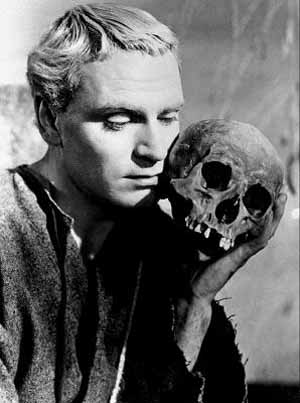Gertrude: Alas, how is't with you,
That you do bend your eye on vacancy,
And with th'incorporeal air do hold discourse?

Is Hamlet truly mad? What makes a person qualify as insane? The words 'insanity' and 'madness' are no longer used to diagnose mental illness. Instead, specific scientific terms such as manic depression or schizophrenia are used to categorize different psychological disorders. Does Hamlet exhibit traits commonly associated with these mental diseases or is it purely an act? Even before his first encounter with the ghost of his father, Hamlet has already established himself as the "Melancholy Dane." Is this part of a natural mourning process or could Hamlet be slipping into depression? Later, in the Queen's bedchamber, he sees the ghost again. But unlike before, when Horatio, Barnardo, and Francisco could see and share the paranormal experience, Gertrude does not perceive the spectre of her dead King. Could this mean that young Hamlet is losing his grip on reality? I think you could argue either way.
At the very least, an actor or director must accept that lunacy and madness are major themes in the play. Ophelia, at least, we know has lost her marbles. She may have even deliberately

committed suicide. Hamlet, we know, has also flirted with suicidal thoughts. He is blessed (or cursed) with a deeply philosophical mind. His private thoughts tend towards themes of death, spirituality, life's purpose, sexual depravity (mainly in women), as well as his own supposed inadequacy. So, I think its fair to assume that even if Hamlet is not certifiably insane, he is at the least unbalanced.
In India, people who are thought to be mad are treated as mystics. Instead of viewing the condition as a misapprehension and misinterpretation of the nature of reality, they see the insane as being privy to a truer, deeper world. Author and poet Kahlil Gibran writes, "Be mad and tell us what is behind the veil of 'sanity.' The purpose of life is to bring us closer to those secrets, and madness is the only means." R.D. Laing, an unorthodox psychiatrist, also emphasizes the link between mystics and schizophrenics. He says: "The mystic and the schizophrenic find themselves in the same ocean, but whereas the mystic swims, the schizophrenic drowns." Hamlet, I think, manages to swim by the end of the play. Even though he meets his death in the final scene, he seems to have conquered many of his neuroses. Ophelia, on the other hand, drowns.
*Here is a music video I found that just screams Ophelia and Hamlet:
Beautiful song...the video reminds me of Millais' Ophelia


No comments:
Post a Comment